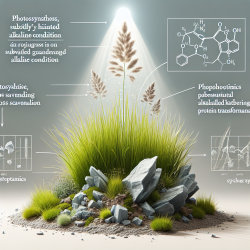Understanding Alkaligrass Resilience: A Deep Dive into Na2CO3 Stress Response
In the world of plant biology, understanding how plants respond to environmental stressors is key to enhancing their resilience. A recent study titled "Na2CO3-responsive Photosynthetic and ROS Scavenging Mechanisms in Chloroplasts of Alkaligrass Revealed by Phosphoproteomics" offers groundbreaking insights into how alkaligrass (Puccinellia tenuiflora) adapts to high-salinity conditions. This research is particularly relevant for educational practitioners and researchers interested in plant biology, environmental science, and sustainable agriculture.
Key Findings from the Study
The study delves into the physiological and proteomic responses of alkaligrass under Na2CO3 stress, revealing several mechanisms that contribute to its resilience:
- Photosynthetic Modulation: The research identifies 104 Na2CO3-responsive proteins in leaves and 102 in chloroplasts, which are crucial for photosynthesis, ion transport, and energy homeostasis.
- Reactive Oxygen Species (ROS) Scavenging: The study highlights the role of ROS homeostasis in protecting plant cells from oxidative damage under stress conditions.
- Protein Phosphorylation: A total of 84 Na2CO3-responsive phosphoproteins were identified, indicating the importance of reversible protein phosphorylation in regulating photosynthesis and stress responses.
- Enhanced Tolerance: Overexpression of a chloroplastic fructose-bisphosphate aldolase (FBA) in a model cyanobacterium demonstrated increased Na2CO3 tolerance, suggesting potential applications in enhancing crop resilience.
Implications for Practitioners
For practitioners in the field of plant biology and education, these findings offer several avenues for application and further research:
- Curriculum Development: Incorporate these findings into educational materials to teach students about plant stress responses and resilience mechanisms.
- Research Opportunities: Encourage students and researchers to explore the genetic and molecular basis of stress tolerance in plants, using alkaligrass as a model organism.
- Sustainable Agriculture: Apply these insights to develop crops with enhanced tolerance to salinity and other environmental stressors, contributing to sustainable agricultural practices.
Encouraging Further Research
This study opens up numerous possibilities for further research. Practitioners are encouraged to delve deeper into the molecular mechanisms underlying plant stress responses. Exploring the potential of genetic engineering and biotechnological applications can lead to the development of crops that are more resilient to changing environmental conditions.
To read the original research paper, please follow this link: Na2CO3-responsive Photosynthetic and ROS Scavenging Mechanisms in Chloroplasts of Alkaligrass Revealed by Phosphoproteomics.










